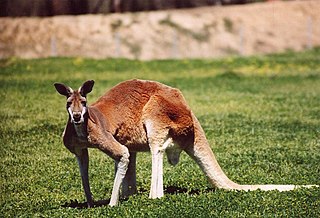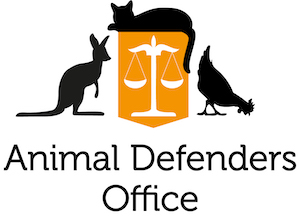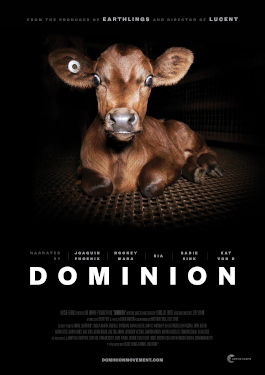
Intensive pig farming, also known as pig factory farming, is the primary method of pig production, in which grower pigs are housed indoors in group-housing or straw-lined sheds, whilst pregnant sows are housed in gestation crates or pens and give birth in farrowing crates.

Animal welfare is the well-being of non-human animals. Formal standards of animal welfare vary between contexts, but are debated mostly by animal welfare groups, legislators, and academics. Animal welfare science uses measures such as longevity, disease, immunosuppression, behavior, physiology, and reproduction, although there is debate about which of these best indicate animal welfare.

Animal husbandry is the branch of agriculture concerned with animals that are raised for meat, fibre, milk, or other products. It includes day-to-day care, management, production, nutrition, selective breeding, and the raising of livestock. Husbandry has a long history, starting with the Neolithic Revolution when animals were first domesticated, from around 13,000 BC onwards, predating farming of the first crops. During the period of ancient societies like ancient Egypt, cattle, sheep, goats, and pigs were being raised on farms.

Free range denotes a method of farming husbandry where the animals can roam freely outdoors for at least part of the day, rather than being confined in an enclosure for 24 hours each day. On many farms, the outdoors ranging area is fenced, thereby technically making this an enclosure, however, free range systems usually offer the opportunity for the extensive locomotion and sunlight that is otherwise prevented by indoor housing systems. Free range may apply to meat, eggs or dairy farming.
Animal welfare and rights in Israel is about the treatment of and laws concerning nonhuman animals in Israel. Israel's major animal welfare law is the Animal Protection Law, passed in 1994, which has been amended several times since. Several other laws also related to the treatment of animals: Rabies Ordinance, 1934; Fishing Ordinance, 1937; Public Health Ordinance, 1940; Wildlife Protection Law, 1955; Plants Protection Law, 1956; Criminal Procedure Law, 1982; Animal Disease Ordinance, 1985; National Parks, Nature Reserves, National Sites and Memorial Sites Law, 1991; the Law of Veterinarians, 1991; Dog Regulation Law, 2002; Rabies Regulations (Vaccinations), 2005; and Prohibition on declawing cats unless for reasons vital to the cat's health or owner's health, 2011.

Kangaroo meat is produced in Australia from wild kangaroos and is exported to over 61 overseas markets.
Intensive animal farming, industrial livestock production, and macro-farms, also known as factory farming, is a type of intensive agriculture, specifically an approach to animal husbandry designed to maximize production while minimizing costs. To achieve this, agribusinesses keep livestock such as cattle, poultry, and fish at high stocking densities, at large scale, and using modern machinery, biotechnology, and global trade. The main products of this industry are meat, milk and eggs for human consumption.
Animal ethics is a branch of ethics which examines human-animal relationships, the moral consideration of animals and how nonhuman animals ought to be treated. The subject matter includes animal rights, animal welfare, animal law, speciesism, animal cognition, wildlife conservation, wild animal suffering, the moral status of nonhuman animals, the concept of nonhuman personhood, human exceptionalism, the history of animal use, and theories of justice. Several different theoretical approaches have been proposed to examine this field, in accordance with the different theories currently defended in moral and political philosophy. There is no theory which is completely accepted due to the differing understandings of what is meant by the term ethics; however, there are theories that are more widely accepted by society such as animal rights and utilitarianism.

The kangaroo industry in Australia is based on the regulated harvesting of species of kangaroos.

Meet Your Meat is a 2002 documentary about factory farming created by People for the Ethical Treatment of Animals (PETA), narrated by Alec Baldwin, and directed by Bruce Friedrich and Cem Akin. The documentary explores the treatment of animals in modern animal agriculture. The film runs 12 minutes long.

Animals Australia is an Australian animal protection organisation. Its aim is to investigate and expose animal cruelty, inspire kindness to animals through public awareness campaigns—particularly focused on farmed animals—and provide funding and support to other animal organisations where appropriate, for example in emergency response during the 2019/2020 Australian Black Summer bushfires and COVID-19 pandemic.
Philip John Lymbery is the Global CEO of farm animal welfare charity, Compassion in World Farming International, Visiting Professor at the University of Winchester’s Centre for Animal Welfare, President of Eurogroup for Animals, Brussels, founding Board member of the World Federation for Animals and a Leadership Fellow at St George's House, Windsor Castle.

Humane Society International Australia (HSIA) is the Australian branch of Humane Society International (HSI), an offshoot of the international animal protection organisation, the Humane Society of the United States (HSUS).

Mark Anthony Pearson is an Australian politician. He was a Member of the New South Wales Legislative Council from 2015 until 2023, representing the Animal Justice Party. Prior to his election, Pearson served as the Executive Director, Animal Liberation based in Sydney.
Animal Liberation is a nonprofit animal rights organisation based in Sydney, founded by Christine Townend and led by current CEO Lynda Stoner. It was formed in 1976, one year after the release of Animal Liberation by Australian philosopher Peter Singer. Animal Liberation's primary campaigns are to advocate against the use of animals for food, clothing, research, sport and entertainment, by promoting a vegan lifestyle.
Animal welfare and rights in South Africa is about the treatment of and laws concerning non-human animals in South Africa.

This article is about the treatment of and laws concerning non-human animals in Australia. Australia has moderate animal protections by international standards.

The Animal Defenders Office (ADO) is an Australian community legal centre focusing on animal law, specialising in issues surrounding impounded dogs, assistance animals, the setting up animal of charities, and the defence of animal activists. The ADO is also involved in a range of community outreach and advocacy activities, including the production of legal fact sheets, presentations in public education forums, community events, and university panels, and involvement with local animal advocacy groups. It is a member of the National Association of Community Legal Centres in Australia, and as such is a not-for-profit organisation that provides free legal advice to the community and advocates for law reform.
Farm Forward is a 501(c)(3) nonprofit whose mission is to promote conscientious eating, reduce farmed animal suffering, and advance sustainable agriculture. Farm Forward aims to eliminate the most harmful practices in intensive animal agriculture, increase the market share of humane and sustainable animal agriculture, and raise awareness about the cultural significance of animal agriculture.

Dominion is a 2018 Australian documentary film filmed primarily with drones and hidden cameras inside Australian slaughterhouses and macro-farms with the aim to expose an opaque and inhumane system, according to the film's writer, director, and producer, Chris Delforce, an animal rights activist. The film documents multiple animal abuse industries in Australia, especially agricultural livestock, while focusing its message on animal rights. Dominion portrays the killing of animals through methods such as using carbon dioxide to gas pigs, maceration of chicks, and skinning foxes alive.













